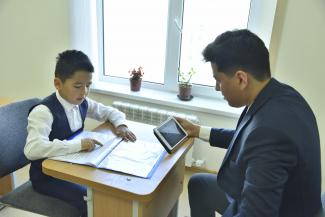The educational system in Uzbekistan remains entrenched in antiquated academic models. Nationwide, instruction is focused on memorization, not on enabling students to apply what they learn. The school day is short (due to widespread double shifts), allocated time for academic subjects is very low and is compounded by an ambitious and congested curriculum that is not based on national standards. USAID’s assistance in the education sector restarted in 2019 to support the President of Uzbekistan and Ministry of Public Education’s ambitious efforts to reform and modernize the education sector and ensure that the human capital development needs of the country are met through the provision of high-quality basic education service delivery.
USAID programs focus on improving reading, math, information and communication technology (ICT), and English skills of students in public schools. The programing works with key stakeholders to produce improved student learning standards, scope and sequence prototypes, student textbooks, and teacher guides in those four subjects, as well as provide capacity enhancement training. Students in up to 1,000 secondary schools and approximately 12,000 primary school teachers, school administrators, and instructional coaches will benefit at the school level.
USAID’s early grade reading and math assessments (EGRA and EGMA) are being used to assist the Ministry of Public Education in obtaining more relevant data on student outcomes and measure competency levels in core skill areas. he results of the EGRA and EGMA will be the first time Uzbekistan will obtain standardized data on the learning outcomes of their students and identify gaps, which will inform future programming. The EGRA and EGMA will sample and assess over 11,000 grade 2 and grade 4 students across Uzbekistan in reading and numeracy.
USAID is expanding its activities to include a work readiness program to equip more of Uzbekistan’s youth with the skills needed to compete in the country’s job market and make meaningful contributions to the economy. The program will provide high-quality resources and training on skills such as entrepreneurship, work readiness, and soft skills and will help more youth access information about training, job shadowing, and job opportunities. To support the newly established Center for Assessment of Knowledge and Skills, a landscape analysis of the assessment system in Uzbekistan will be conducted. The comprehensive analysis will reveal the gaps, challenges and opportunities and provide concrete policy recommendations for the country as a whole on how to improve the assessment system.
Results:
- The EGRA and EGMA were piloted in 70 schools in 6 provinces across Uzbekistan. The outbreak of COVID-19 and the uncertainty of school operations has forced postponement of the implementation of the EGRA and EGMA, currently scheduled for Spring 2021.
- A global education advisor was deployed to the Ministry of Public Education to provide advisory services related to strategic planning and management of large-scale reform efforts, resource allocation, and mobilization of external resources.
- To prevent the spread of COVID-19 among schoolchildren in Uzbekistan, Public Service Announcements (PSAs) and print materials were developed through Sesame Workshop to help families acquire new healthy habits. The media package reached 7 million people daily, and a survey conducted by the Ministry of Public Education showed that 75 percent of responders found the PSAs extremely useful.

